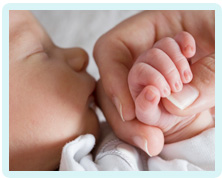
Urinary Incontinence after a 3rd Degree Tear
A traumatic birth involving a 3rd degree tear can weaken the pelvic floor. This can lead to urinary incontinence.
"Before we contacted you we had no real idea that we had grounds for a medical negligence claim but after speaking to you it became clear that Wendy was indeed treated poorly. Chris Bird took the time to explain what was happening and kept us to speed. Our deepest gratitude to you all and Chris in particular."
Mr And Mrs H
If you have suffered a perineal tear and would like advice about a possible medical negligence claim, please call us on 0800 234 3300 (or from a mobile 01275 334030) or complete a Free Online Enquiry.
Claims Involving Birth Tears That Glynns Solicitors Have Settled
- » £340,000 For Badly Repaired 4th Degree Tear
- » £100,000 for Poor 3rd Degree Tear Repair
- » Missed 4th Degree Tear After Midline Episiotomy
- » Two Year Delay in Diagnosing Third Degree Tear
- » Unrecognised Third Degree Tear
- » £200,000 Settlement For Missed Third Degree Tear
- » £300,000 For Missed Fourth Degree Tear
- » Junior Doctor Fails To Diagnose Third Degree Tear
Incontinence after birth
There are different types of urinary incontinence. Stress incontinence is when a bit of urine leaks out accidentally while coughing, sneezing, laughing, jumping, running or during other sudden 'stress' movements. Urge incontinence is when it is hard to prevent the passing of urine when the need arises, meaning it leaks out before a toilet can be reached.
When a woman develops incontinence after having a baby, she will usually be suffering from stress incontinence, although there can be urge incontinence. Stress incontinence happens because the pelvic floor and other surrounding structures have been damaged during the pregnancy and birth.
The pelvic floor is damaged during pregnancy because the weight of the unborn baby puts the muscles under great strain. The hormonal changes experienced during pregnancy can also make the muscles weaker. In addition, a vaginal delivery will injure the pelvic floor as the muscles will be severely traumatised by the passing of the baby.
Improving urinary incontinence after childbirth
In order to improve urinary incontinence after childbirth, the best thing to do is regular pelvic floor exercises. A patient should be advised how to do pelvic floor exercises shortly after the birth. These can be done at home without any specialist equipment.
Patients who sustain a 3rd degree tear should also be referred to a woman's health physiotherapist. These appointments will help to further strengthen the pelvic floor. Again, the physiotherapist will give the patient some exercises to do at home.
Unfortunately the pelvic floor may never be entirely normal after giving birth. Some women never regain the function they once had, and often any problems will deteriorate with the effects of aging and the menopause.
Incontinent of faeces
Some women will also find it difficult to control the passing of wind and faeces (poo) after giving birth. If this does not resolve within a few weeks, the patient should speak to a medical practitioner about their problems, as there could be something wrong.
One possibility is that there is a perineal tear that has extended to the anal sphincter; making it a 3rd or a 4th degree tear. These tears should be diagnosed and repaired soon after the birth. But it may be that your tear was not identified, or was 'under-diagnosed' (meaning it was mistaken for a 1st or 2nd degree tear).
If you do discover that you have an unrepaired 3rd degree tear, you could be entitled to pursue a claim for compensation. Contact us for more information.
Please call us on 0800 234 3300 (or from a mobile 01275 334030) or complete a Free Online Enquiry.



